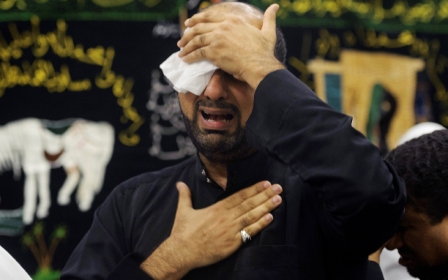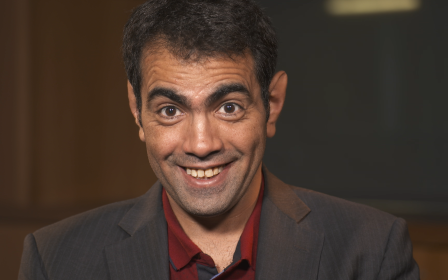Court filings show some executed by Saudi Arabia recanted confessions, said they were tortured: Report

Amid outrage at the 37 activists Saudi Arabia executed on Tuesday, CNN has obtained documents showing that some of the suspects had recanted their confessions, claiming they were obtained under torture.
Hundreds of pages of documents from three 2016 trials provide details for 25 of the 37 men executed by the kingdom.
New MEE newsletter: Jerusalem Dispatch
Sign up to get the latest insights and analysis on Israel-Palestine, alongside Turkey Unpacked and other MEE newsletters
CNN did not publish the documents themselves but provided a fully redacted page that shows the date and seal of the court.
Saudi Arabia has said in the past that all 37 men who were executed had pleaded guilty to charges ranging from spying for Iran to participating in anti-government protests - crimes that amount to terrorism in the kingdom.
Thirty-two of those executed were from Saudi Arabia's Shia minority and a number of them were juveniles when they were arrested, including a teenager who had planned to study in the US.
According to CNN, the documents show that some of the men repeatedly told the court their confessions had been obtained through torture.
The 37 Saudis executed on 23 April
+ Show - HideAhmed Hasan Ali al-Rabee, Ahmed Hussien Ali al-Aradi, Ahmed Faisal Hasan al-Darwish, Jaber Zouhir Jaber al-Marhoun, Hussien Hasan Ali al-Rabee, Hussien Ali Jassim al-Hamidi, Hussien Qassem Ali al-Aboud, Hussien Mohammed Ali al-Meslim, Haider Mohammed Ibrahim al-Leef, Khaled Hammoud al-Farraj, Khaled Abdelkarim Saleh al-Touijri, Salem Abdullah Awad al-Amri al-Harbi, Saeed Mohammed Saeed al-Skafi, Salman Amin Salman al Quriash, Taleb Meslim Suliman al-Harbi, Taher Meslim Suliman al-Harbi, Abbas Hajji Ahmed al-Hasan, Abdulaziz Hasan Ali al-Sahwi, Abdelkarim Mohammed al-Hawaj, Abdullah Suliman Saleh al Esraih, Abdullah Adel Hasan al-Oujan, Abdullah Hani Abdullah al-Tareef, Aziz Mahdi Abdullah al-Rafe al-Omari, Ali Hussien Ali al-Ashour, Ali Hussien Ali al-Mihna, Fadel Hasan Abdulkarim Labbad, Mujtaba Nader Abdullah al-Suwayket, Mohammed Hussien Ali al-Ashour, Mohammed Saeed Abdrab al-Rasoul al-Khatem, Mohammed Ayed Mohammed al-Namlan al-Qahtani, Mohammed Abdelghani Mohammed Attyieh, Mohammed Mansour Ahmed al-Naser, Mustafa Ahmed Abdelatif Darwish, Mutadher Ali Saleh al-Sabieti, Munir Abdullah Ahmed al-Adam, Hadi Yousif Reda al-Hazeem and Yousif Abdullah Awad al-Omari.
Others said they had never confessed, only providing their thumbprints on confession documents written up by people who had tortured them.
"Those aren't my words," said one of the executed men, Munir al-Adam, during the trial, according to CNN's description of the case documents.
"I didn't write a letter. This is defamation written by the interrogator with his own hand."
On Tuesday, Reprieve, a UK-based campaign group that opposes the death penalty, told Middle East Eye that five of its clients were among those killed.
The group said all five had been tortured into making false confessions, including al-Adam, who was beaten so badly after his arrest in 2012 that he was left permanently deaf in one ear.
In 2017, the United Nations raised concerns that Adam and 16 others being detained by Saudi Arabia had not had access to fair trials or due process, "including allegations of confessions obtained under torture".
The UN at the time also highlighted allegations of human rights violations in relation to several other death penalty cases.
Saudi Arabia responded to the allegations in a letter that denied the UN's claims, stating that the men had stood by their admissions of guilt in court.
Tuesday's executions were the largest number to take place in the Gulf state in more than three years.
Middle East Eye delivers independent and unrivalled coverage and analysis of the Middle East, North Africa and beyond. To learn more about republishing this content and the associated fees, please fill out this form. More about MEE can be found here.





